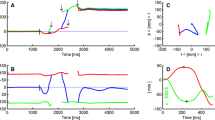Abstract.
Although ataxias of stance and gait are frequent manifestations of cerebellar disease, the number of human studies examining stance or gait in cerebellar subjects is limited. In the present study, we examined whether anticipatory postural adjustments were impaired in cerebellar subjects during perturbed and unperturbed step initiation. The first aim was to show possible abnormalities in timing, force and kinematic parameters of anticipatory postural adjustments in unperturbed stepping in cerebellar subjects. Second, we examined the ability of cerebellar subjects to modify anticipatory postural adjustments associated with step initiation in response to a backward translation. Finally, we asked whether cerebellar subjects (and controls) make use of predictive knowledge of perturbation amplitude in perturbed stepping. Only few abnormalities of anticipatory postural adjustments were found in cerebellar subjects compared to controls. Both in the unperturbed and perturbed step conditions, force production as well as step length and step velocity were reduced in cerebellar subjects compared to controls, suggesting compensatory slowing. Cerebellar subjects also appeared to be less able to use predictive information of perturbation amplitude to scale anticipatory postural adjustments than control subjects. Nevertheless, in unperturbed steps, temporal parameters of anticipatory postural adjustments were preserved in cerebellar subjects. When subjects voluntarily initiated a step in response to the surface translation, both control and cerebellar subjects adapted by executing the anticipatory postural adjustments for step more rapidly. Furthermore, both control and cerebellar subjects were able to use online information regarding perturbation amplitude to scale parameters of step initiation in perturbed stepping. Overall, our findings suggest that the cerebellum is neither critical for the basic motor program underlying unperturbed step initiation nor for many adaptive changes occurring during perturbed step initiation. Like its role in predictive scaling of automatic postural responses to external perturbations, the cerebellum appears to be important for predictive adaptation of anticipatory postural adjustments during step initiation.
Similar content being viewed by others
Author information
Authors and Affiliations
Additional information
Electronic Publication
Rights and permissions
About this article
Cite this article
Timmann, .D., Horak, .F. Perturbed step initiation in cerebellar subjects: 2. Modification of anticipatory postural adjustments. Exp Brain Res 141, 110–120 (2001). https://doi.org/10.1007/s002210100858
Received:
Accepted:
Issue Date:
DOI: https://doi.org/10.1007/s002210100858




